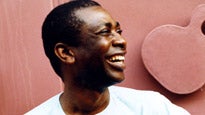Youssou N'Dour, Royce Hall
 Band: N'Dour, El Hadji Faye, Assane Thiam, Papa Omar Ngom, Ablaye Lo, Moustapha Faye, Birame Dieng, Mamadou Mbaye, Habib Faye.
Band: N'Dour, El Hadji Faye, Assane Thiam, Papa Omar Ngom, Ablaye Lo, Moustapha Faye, Birame Dieng, Mamadou Mbaye, Habib Faye.When, six songs into his 18-song set Saturday night, Senegalese superstar Youssou N'Dour asked to see some dancers, his audience took the invitation seriously. First a trickle, then a stream of (mostly) women -- including toddlers dragging their mothers -- ecstatically made their way down the aisles to the foot of the stage to writhe in ways that the human body was not designed to writhe. Soon the entire sold-out Royce Hall audience was on its feet.
From that moment, the show -- which was already pretty impressive -- turned from a simple concert to a celebration. The band's playing became looser, the grooves airier; the song structures less formal and more elastic. The one-chord vamps stretched out indefinitely, the harmonies changing as the two guitars, bass, keyboards, Assane Thiam's expressive talking drum and three percussionists shifted, like gears, into different musical patterns. increased speed so precipitously, it threatened to take off;"Bandiene" "Set" turned a corner, moving from sprightly to thunderous, with a slight change in the guitar line. It's a sound that reflects the title of his new Nonesuch album, "Rokku Mi Rokka (Give and Take)."
N'Dour's voice turned more urgent with the aud's enthusiastic reaction, wringing waves of emotion with a repeated "Senegal" at the end of "Immigrés" and breaking out a precise, aching soprano during "Birima." He can rally like a trumpet, cajole like a tenor sax and add the grave authority of a French horn. You don't have to speak Wolof to understand why he has been named one of Time Magazine's "100 Most Influential People."
He carries such conviction that the aud stayed on its feet even during a heartfelt speech -- read off a page -- recognizing World AIDS Day, and asking the aud to write representatives to help not only the battle against AIDS, but malaria. It was followed by the brooding prayer, "New Africa," its swelling keyboards reflecting the influence of Peter Gabriel. Other influences could be heard throughout the night -- Paul Simon (who collaborated with N'Dour on "Graceland") on "Baye Fall," and some North African arabesques on the love song "Letema," but N'Dour avoids the bland diplomacy of "world music." No matter what style he plays, his music remains identifiably his own.
(Royce Hall; 1800 seats; $60 top) Presented by UCLA Live. Reviewed Dec. 1, 2007.
By STEVEN MIRKIN





Aucun commentaire:
Enregistrer un commentaire